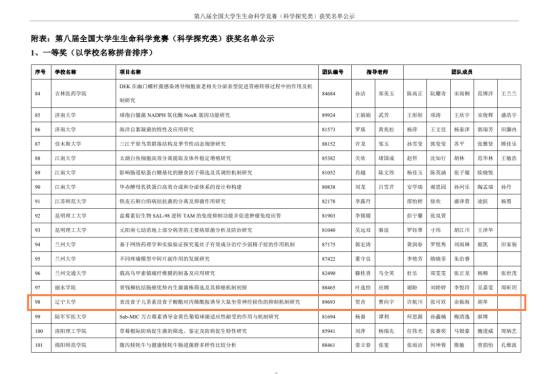The final event of the Eighth National College Students' Life Science Competition (Scientific Inquiry category) was successfully concluded on August 18, 2023.
The competition encompassed 12,069 teams from 562 universities across the country, with a total of 225 first prizes, 434 second prizes, 1,100 third prizes, and 55 excellent organization awards being given.
First prizes were won by Xu Hangchuan, Zhang Kexin, Yu Zhenhai, and Hu Shan of LNU’s Academy of Life Sciences for their project on the inhibitive mechanism of epigallocatechin on acrylamide-induced sciatic nerve injury in rats (aided by instructors He Yin and Cao Xiangyu). This victory represented the best result our school achieved in this competition.
Awards of the Eighth National College Students' Life Science Competition (Scientific Inquiry category) (part)

The National College Student Life Science Competition (CULSC) is one of the 56 national discipline competitions for college students recognized by the Ministry of Education. It is regarded as the most authoritative and influential national discipline competition for college students in the field of life science and aims to encourage college students to focus on scientific problems in related fields of life science, while encouraging interdisciplinary fields to carry out independently designed experiments or investigations in the wild, in order to find effective ways to solve such problems.
Liaoning University attaches great importance to fusing students’ basic theory learning with scientific research through training and practice, which enhances learning and teaches competitiveness, fosters students' scientific research and innovative abilities, and promotes students' comprehensive development.
The Academy of Life Sciences established its team in November 2022, completed experimental design through February 2023, officially began experimentation in March, completed its network evaluation in June, won the provincial first prize of the provincial final in July, and subsequently won the national first prize of the national final in the Northeast Agricultural University division in August. It's been actively prepared for the contest slowly and steadily for 10 months,and finally received good results.
Xu Hangchuan: Male, biotechnology Class 2, Academy of Life Sciences, Grade 2021

Zhang Kexin: Female, biotechnology Class 2, Academy of Life Sciences, Grade 2021

Yu Zhenhai: Male, Biotechnology Class 2, Academy of Life Sciences, Grade 2021

Hu Shan: Female, biotechnology Class 1, Academy of Life Sciences, Grade 2021

Mentor He Yin: a lecturer of the Academy of Life Sciences Research interests: molecular nutrition, functional food, etc

Cao Xiangyu: Professor and Vice President of the Academy of Life Sciences Research
Field interests: Molecular nutrition, environmental toxicology, etc

Introduction of the winning projects:
Acrylamide (ACR) is a widespread neurotoxic contaminant in food and the environment, while epigallocatechin gallate (EGCG) is one of the most important active ingredients of green tea. It has been shown that EGCG can inhibit the ACR in causing injury to the central nervous system, while it remains unreported whether EGCG can inhibit the peripheral nerve toxicity of the ACR. This study aimed to explore whether EGCG can inhibit ACR-induced sciatic nerve injury and related molecular mechanisms. This study used SD rats as the research object, observing and comparing the clinical status of each treatment group. Using the expression of myelin basic protein and tubulin, the study proved that EGCG can inhibit the sciatic nerve injury induced by ACR. By exploring the related mechanisms using TUNEL staining and Western Blot, the results showed that the mechanism of the inhibition of sciatic nerve injury caused by ACR may be related to the inhibition of apoptosis, cell inflammation, and pyroptosis. This study lays a foundation for a comprehensive explanation of the inhibition mechanism of EGCG to ACR neurotoxicity, thus reducing the potential harm of ACR to human health, while also providing for an in-depth exploration and development of EGCG biological activity.
The victory achieved at the Eighth National College Students' Life Science Competition exemplifies the solid theoretical foundation and experimental skills of LNU’s students, who possess a good sense of innovation and scientific-research thinking, as well as a unifying and striving team spirit. Their award also embody the achievements of practical education and scientific research education. The competition further promotes the education and teaching reform of life-science subjects, improves the quality of talent training, and also enhances the application of college learning to real-world communication.